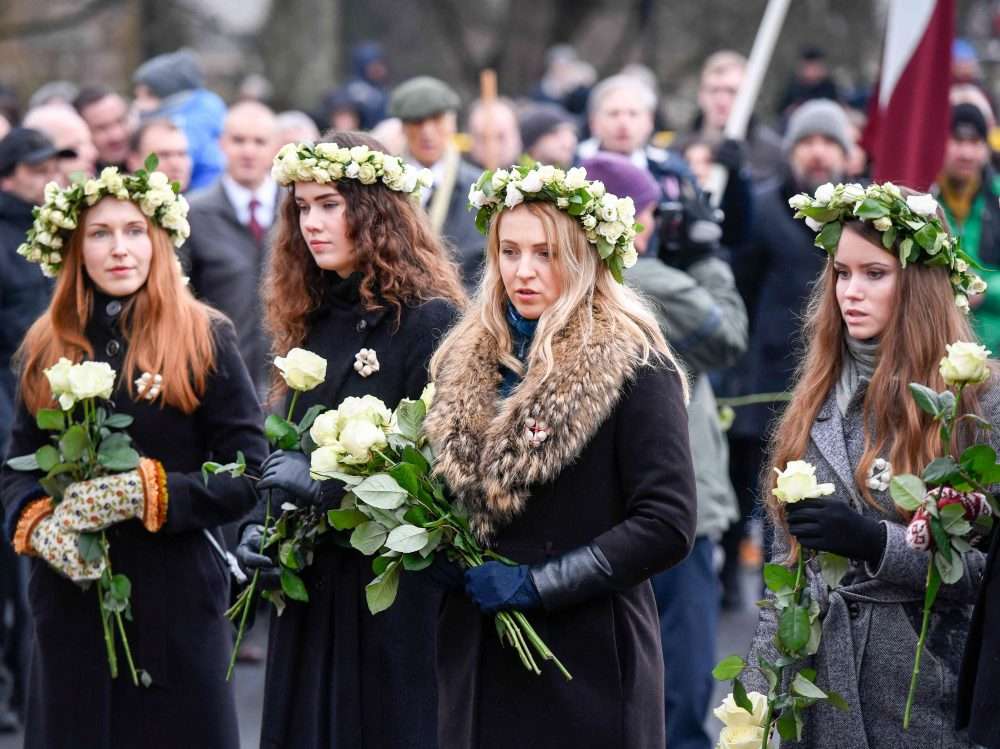The Canadian government has added its voice to those condemning an annual parade in Latvia’s capital honouring members of the Nazi SS, saying it opposes any such event glorifying Adolf Hitler’s regime.
Around 1,000 people marched in the parade in Riga on March 16 in honour of the Latvian SS divisions which fought for the Nazis in the Second World War. Some in the parade wore swastikas and other Nazi insignias.
The parade has been controversial for decades. The United Nations, European Parliament and various politicians have raised concerns about the event, and Jewish groups have called on Latvia to put a halt to the gathering.
Amy Mills, a spokeswoman for Global Affairs Canada, said the Canadian government seeks to promote tolerance and respect for human rights. “Canada is strongly opposed to the glorification of Nazism and all forms of racism, racial discrimination, xenophobia, intolerance and extremism,” Mills said. ”That is why we condemn the parade to commemorate the Latvian SS Brigade held in Latvia on March 16th.”
“We do not tolerate antisemitism of any form, at any time, or in any place and are deeply concerned about new and resurgent forms of antisemitism and discrimination worldwide, rooted in a misguided belief that diversity is a threat,” she added.
Every country must come to grips with difficult periods in its past
The Canadian Forces has 540 soldiers in Latvia and leads a NATO battlegroup there. They have been in Latvia since mid-2017 and the Liberal government says they will remain there until 2023. Mills said Canada’s close relationship with the country includes discussions on the development of an “inclusive Latvia.”
“Every country must come to grips with difficult periods in its past,” she added.
Hitler ordered the creation of the Latvian SS divisions in 1943, with the initial core of the force made up of members of Latvian units such as the Arajs Kommando, which participated in the murder of 26,000 Jews. Other Latvians were conscripted to join the force.

Some members of the Latvian SS Division were among the last hold-outs of Hitler’s regime, defending parts of Berlin during the final days of fighting in the Second World War.
The Latvian government has defended the parade, saying that “16 March is not an official remembrance day, and people, on their own private initiative, pay their respects to the fallen soldiers.”
The Latvian government also has on its website a 14-page document that argues Russian “disinformation” is behind efforts to paint the gathering in an unfavourable light.
The Latvian Legion as a military formation has no relation to the Holocaust or war crimes
“The Latvian Legion as a military formation has no relation to the Holocaust or war crimes,” the document from Latvian historians noted.
The document did, however, acknowledge that some members who served in the Latvian SS units were tried after the war for their participation in the Holocaust but suggests those killings of innocent people were done before they joined the SS formation.
The Embassy of Latvia in Canada has also pushed back against criticism of members of the Latvian SS units and the annual parade. It recently labelled a Ottawa Citizen commentary describing the participation of Latvians in the SS division and the Holocaust as a “threat to democracy in the world.”
“One must study history in order to understand the truth,” the embassy added in a tweet.

The Latvian historians state 80 to 85 per cent of those Latvians who served in the SS division were conscripted and had strong anti-German sentiments. Many Latvians see those who fought in the SS unit as heroes since they battled the Soviets. The Soviet Union, at the time, was allied with the U.S., Britain, Canada and other nations who formed an alliance to defeat Nazi Germany and the nations that supported Hitler.
B’nai Brith Canada has also raised concerns about the parade and other events in Latvia. In the summer of 2018 B’nai Brith Canada’s chief executive officer Michael Mostyn called on Prime Minister Justin Trudeau to use his trip to Latvia that year to push back against that country’s glorification of Nazi collaborators as well as attempts to deny the nation’s role in the Holocaust. “We must challenge all those who distort the historical record on governments, military units or organizations that fought with, supported or sympathized with the Nazis during World War II,” Mostyn wrote to Trudeau. “This includes government leaders who acquiesce in, or fail to condemn, a process of Nazi glorification that amounts to Holocaust distortion.”
One must study history in order to understand the truth
In 2014 the Israeli government raised concerns about a musical being performed in Latvia that celebrated the life of Nazi war criminal Herbert Cukurs. Cukurs was a key member in the Arajs Kommando and was known as the “Butcher of Riga.” A number of Holocaust survivors have directly linked Cukurs to the murder of Jews. Cukurs is a national hero in Latvia.
Concerns have also been raised about similar events in other nations. In late April 2018 more than 50 members of the U.S. Congress condemned Ukraine’s ongoing efforts to glorify those Ukrainians who collaborated with the Nazis. The letter, signed by both Republicans and Democrats, outlined concerns about ongoing ceremonies to glorify leaders of the Ukrainian Insurgent Army as well as 14th SS Galizien Division.
In 2018 the Trudeau government removed a number of Russian diplomats from Canada, citing their efforts that outed Foreign Affairs Minister Chrystia Freeland’s Ukrainian-born grandfather, Michael Chomiak, as a Nazi collaborator. Trudeau said the Russians were “sharing scurrilous stories” about Freeland on social media.
Chomiak edited a newspaper for the Nazis which included anti-Semitic essays and cartoons as well as articles highlighting the need for Ukrainians to join the SS. The Los Angeles Museum of the Holocaust, which has copies of Chomiak’s publication in its archives, describes it as a “collaborator” newspaper.
























